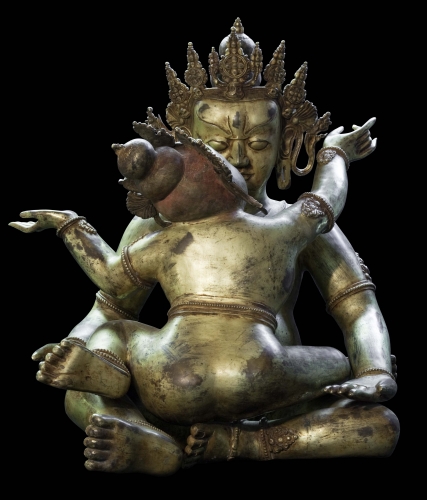It’s Valentine’s Day! Depending on how you want to look at it, either love and compassion are floating all around us or it’s the biggest day of giving in to our clinging and compulsions. To honor Buddhism’s often complicated relationship with sex and romantic love, we decided to do a special interview with Tricycle contributing editor Allan Badiner, adjunct faculty in transformative studies at the California Institute of Integral Studies. Badiner holds a masters degree in Buddhist studies and has been a student of Thich Nhat Hanh for over 20 years.
If I want to live an enlightened life, do I need to stop having sex? Yes, you would need to stop. But only to demonstrate sufficiently to yourself that you are able to do so. Subsequently you will be acting from real choice—not habit, compulsion, or escape. It would be sex as a conscious choice. I imagine that the quality of the experience can only benefit from more consciousness and self-awareness.
Buddhism is not inclined to deny the reality of basic human impulses, including sexuality. As sexuality is a normal, healthy, and necessary aspect of human existence, Tibetan tantric Buddhism even includes techniques for bringing mindfulness and practice to it. Some recent Tibetan teachers and several colorful Zen masters have been open to using sex as a skillful means to point their students toward realization.
Why is it then that Buddhist monks and nuns have traditionally refrained from sexual activity? Sex is the ever-sweet and ever-present distraction. It’s understandable why diminishing one’s attachment to sex is helpful to keep Buddhist initiates focused on self-development. Monks and nuns have always had strict limitations on physical contact between them, and between them and laypeople. But the Buddhist rulebook (the Vinaya) was mostly about protecting bhikkhus and nuns from harm or abuse.
There is also a higher standard of restraint expected for clergy, although historically it hasn’t always been actualized, and there are multiple teachers famous for crossing the line.
In the West, the majority of us never really question the positive value of romantic relationships. We might complain about them, or roll our eyes at them, but, mostly, we assume that they are what we need on a fundamental level. Should we be thinking more critically about our deep belief in romantic relationships? All beliefs should be subject to questioning, including the idea that romantic relationships are always what we need. Ironically, letting go of such a belief may make it more possible for a romantic relationship to actually manifest.
I just read a review of a book in The Atlantic called Love 2.0: How Our Supreme Emotion Affects Everything We Feel, Think, Do, and Become, in which the psychologist Barbara Fredrickson asserts there’s no such thing as everlasting love. She talks about micro-moments of positive resonance versus a romantic commitment that you share with one special person, a notion she calls “the love myth.” She says new scientific studies show that this belief “limits the health and happiness you can derive” from everyday love. Buddhism never argues with good science.
Usually we find ourselves somewhere along a spectrum of romantic involvements, and there isn’t one sweet spot for everyone. Buddhism is fairly agnostic about romantic relationships or marriages and doesn’t overly concern itself with issues like infidelity, disloyalty, and divorce. Obviously fidelity and loyalty are usually seen as essential components of a happy marriage, but Buddhism views marriage as a secular institution and leaves people to sort these things out for themselves, including whether the relationship is between same or different genders as well as between two or more partners.
As lay Buddhists, how can we begin to have rewarding, non-harming relationships? You are more likely to have rewarding, non-harming relationships if that is in fact your goal. And that is the goal in Buddhism for all your relationships—from family to strangers. The Pali word metta—the name for the powerful Buddhist meditation on lovingkindess—means the nature of a friend (Mit-tassa’Sa’-bhavo). Anyone with mindfulness of that goal can achieve it, Buddhist or otherwise.
Have you seen the “Dharma Match” advertisements in Tricycle? Maybe not the classiest way to meet people, but there seems to be increasing acceptance and use of online dating services, so why not one for singles with an interest in dharma. I should check it out!
P.S. Having a rough Valentine’s Day? Check out our online retreat with Ezra Bayda on Relationships, Love, and Spiritual Practice here.
[This story was first published in 2013]
Thank you for subscribing to Tricycle! As a nonprofit, we depend on readers like you to keep Buddhist teachings and practices widely available.
